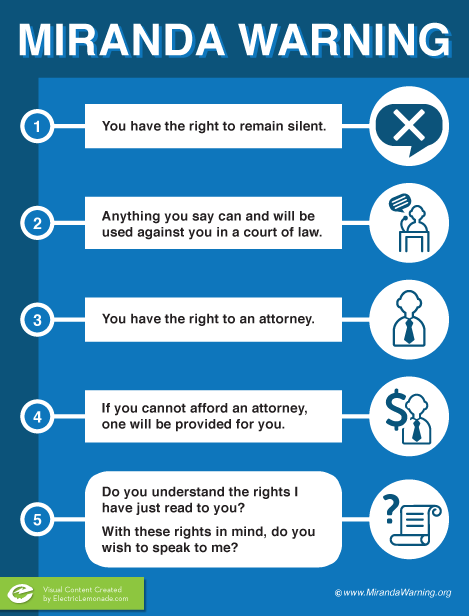What Are Your Miranda Rights?
The wording used when a person is read the Miranda Warning, also known as being ‘Mirandized,’ is clear and direct:
“You have the right to remain silent. Anything you say can and will be used against you in a court of law. You have the right to an attorney. If you cannot afford an attorney, one will be provided for you. Do you understand the rights I have just read to you? With these rights in mind, do you wish to speak to me?”
An Explanation of Your Rights
- What exactly does it mean when an officer says, "You have the right to remain silent?”
- Please explain the phrase: "Anything you say can and will be used against you in a court of law."
- Please explain the phrase: "You have the right to an attorney. If you cannot afford an attorney, one will be provided for you."
- What If a Person Wasn't Read Their Rights?
- Waiving Miranda Rights Explained
- What is the difference between Miranda Rights and Miranda Warning?
- What is an Interrogation?
- When are police required to read the Miranda Warning?
- Are there exceptions to when the officer needs to read Miranda Rights?
Questions? Click here to send us your questions today.
Some police departments in Indiana, New Jersey, Nevada, Oklahoma, and Alaska add the following sentence:
“We have no way of giving you a lawyer, but one will be appointed for you, if you wish, if and when you go to court.”
The suspect must give a clear, affirmative answer to this question. Silence is not acceptable as waiving these rights because the arrestee may not understand or may not speak English as his or her first language. If the Miranda Warning must be translated to the suspect, that translation is usually recorded.
Invoking Your Miranda Rights
If the individual indicates in any manner, at any time prior to or during questioning, that he or she wishes to remain silent, the interrogation must cease. If the individual states that he or she wants an attorney, the interrogation must cease until an attorney is present. At that time, the individual must have an opportunity to confer with the attorney and to have him or her present during any subsequent questioning.When The Police Must Read Your Rights
It is important to note that police are only required to Mirandize a suspect if they intend to interrogate that person under custody. Arrests can occur without the Miranda Warning being given. If the police later decide to interrogate the suspect, the warning must be given at that time. Their vigilance to this rule means less chance of a case being overturned in court due to poor procedure on their part.
If public safety is an issue, questions may be asked without the defendant being Mirandized, and any evidence obtained may be used against the suspect under these circumstances. The Miranda Warning is all about questioning and being protected from self-incrimination under the Fifth Amendment, not being arrested.
The person arrested must still answer questions asked about their name, age, address, etc. They can be searched in order to protect the police officer. Also, a confession given before a suspect has been read the Miranda Warning may find that confession entered as evidence in court.
If you have been Mirandized and you waive your rights, meaning you wish to speak to police freely without an attorney present, you can change your mind at any time and ‘plead the fifth,’ meaning you no longer wish to answer questions, or that you have changed your mind and wish to have an attorney present after all.
In some states, juveniles have the right to remain silent without his or her parent or guardian present.
US military branches provide for the right against self-incrimination by providing a form that informs the suspect of the charges and their rights. They are required to sign the form. Read more about Article 31 vs. Miranda.
Understanding Your Rights
- What exactly does it mean when an officer says, "You have the right to remain silent?”
- When You Have the Right to Request an Attorney
- If I choose to remain silent, can this be used against me in my case?
- Situations Where Miranda Rights Do Not Apply
- Can remaining silent prior to being read your Miranda Rights be used against you later on?
- Please explain the phrase: "Anything you say can and will be used against you in a court of law."
- Please explain the phrase: "You have the right to an attorney. If you cannot afford an attorney, one will be provided for you."
- What is the difference between Miranda Rights and Miranda Warning?
- What is an Interrogation?
- When are police required to read the Miranda Warning?
- Are there exceptions to when the officer needs to read Miranda Rights?
- Type of Attorney That Handles Miranda Rights Cases
- Do Miranda Rights Apply if They Were Not Read?
- Best Way to Exercise Your Miranda Rights
- Application of Miranda Rights with Minors
- Purpose of Miranda Warning
- Origination of Miranda Rights
- Miranda Rights and Warning Explanation
- When Miranda Warning Applies
- Why The Right To Remain Silent is Important
- How Miranda Rights Protect People From Abuse
- Miranda Rights Affect On Guilty Confessions
- Exceptions to Miranda
Miranda Warning Issues
- I was not read my Miranda Rights. Will my case be dismissed?
- What does it mean to “plead the Fifth”?
- I was read my Miranda Rights, but the arresting officer did not read it correctly. Does this help my case?
- The police officer did not finish reading me my Miranda rights. How will this impact my case?
- What is the Miranda Warning?
- I interrupted the arresting officer while he/she read my Miranda rights. Can this help my case?
- I could not hear the Miranda Rights being read due to background noise distractions. What does this mean for my case?
- What does it mean when a person "waives” their Miranda Rights?
- Allowed Police Questions Before Miranda Warning
- Person Confesses a Crime to Undercover Police Officer
- Legal for Police to Delay Reading Miranda Rights
Specific Cases
More Information
- Are police always required to read Miranda rights?
- What is the difference between custody and interrogation?
- Why is the Fifth Amendment important in a criminal case?
- Do Miranda rights have to be read at the time of arrest?
- Do Miranda rights have to be read during a DUI arrest?
- Do Miranda rights have to be read verbatim?
- Do Miranda rights apply to non-US citizens?
- Do Miranda rights have to be read for a misdemeanor or a civil infraction?
- Do Miranda rights have to be read to minors?
- How are Miranda rights read or presented to a suspect who does not speak English?
- What happens to a suspect who cannot afford an attorney?
- Are there special provisions made for suspects who cannot read?
- Can a case be dismissed if a person is not read his/her Miranda rights?
- Police Officer Using Intimidation at Questioning
- Limits to Type of Questions During Interrogation
- If Innocent Will a Statement Hurt My Case?
- Changes Applied to Miranda During Warren Court
- Coerced Confession Explained
- Role Politics and Current Events Change Miranda
- Is Miranda Warning the Same in Every State?
- Public-Safety Exception to Miranda


